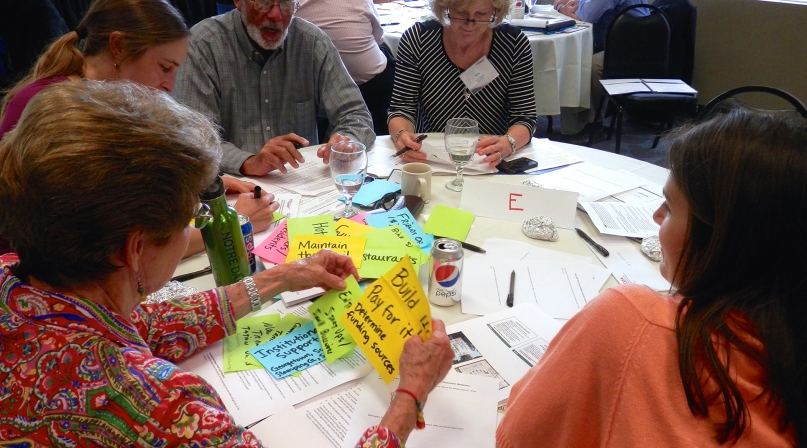Five counties' Prosperity Summits strengthen local economic prospects
Upcoming Events
Related News

This spring, NACo partnered with the Ford Foundation and leading economic development experts from the WealthWorks community of practice to hold a series of County Prosperity Summits in rural and mid-sized counties across the country.
The County Prosperity Summits were based on the WealthWorks framework, an approach to economic development that has evolved via a partnership among the Ford Foundation, the Center for Rural Entrepreneurship, the Aspen Institute, Yellow Wood Associates and other leaders that now form an integrated network of national and regional partners working in this field (full list available at www.WealthWorks.org).
The WealthWorks framework promotes an approach to economic development that links a community’s assets to meet market demand in ways that build lasting livelihoods. Essentially, this approach seeks to build and retain wealth locally, in which all partners of an economic system, from producer to consumer, are engaged in a mutually supportive set of relationships.
NACo launched the County Prosperity Summits program in fall 2014, inviting small and mid-sized counties (with a population of less than 200,000) to apply to hold a one-day summit in their county with support from NACo.
Five counties were selected: Shasta County, Calif.; Scott County, Ky.; Cape May County, N.J.; Cheatham County, Tenn.; and Titus County, Texas.
Each summit involved approximately 50 participants invited by the host county, representing a broad mixture of county elected officials and staff, other local and regional public officials, business owners and representatives of the nonprofit and philanthropic community.
NACo worked with each selected county to develop an agenda tailored to a specific emerging economic sector, or several sectors, identified by the county as holding potential for growth and resonance with the WealthWorks approach. Each event was facilitated by economic development experts: Deb Markley, co-founder and managing director of the Center for Rural Entrepreneurship, and Barbara Wyckoff, CEO of Dynamica Consulting, traded off this duty. Markley and Wyckoff also acted as project advisors throughout the process. The facilitators were accompanied by a “storyteller”— an economic development practitioner with hands-on experience in cultivating complex, sustainable partnerships at the local or regional level. The storyteller’s role was to add local context and describe how the WealthWorks framework looks in a real community.
After learning about the WealthWorks framework and hearing its application in local communities, summit participants quickly got to work. Grouped into multidisciplinary teams to foster new networking and collaboration potential, participants worked through a series of exercises to diagram their community’s existing and underutilized assets and identify opportunities to strengthen specific sectors at hand.
Check out summit materials
All materials from the summits, as well as detailed summaries of each event, are available online at www.naco.org/prosperity. Additionally, NACo has launched a Digital Journal to document and share the lessons of each county summit.
The team-based exercises culminated in the construction of sector-specific “value chains.” Value chains refer to networks of people, businesses, organizations and agencies that work together to address a specific market for a type of product or service — be it locally grown fruit, regionally produced craft beer or heritage-based tourism activities. The difference between a value chain and a typical supply chain is that partners in a value chain, while still advancing self-interest, are collaborating in a system that will bring multiple types of local and regional wealth to a community. Think of it as a venture undertaken by a group of investors: Each is looking to generate a good return on investment, but they are also motivated by social, political, environmental or other types of co-benefits that build on each other and can be reinvested. For example, Scott County leaders developed a value chain for a multi-use trail system that not only identified various end users (also known as demand partners) — such as school groups, tourists and property owners — but also pinpointed the existing infrastructure, businesses, natural resources and other local assets that would benefit from the trail system.
At each summit, teams charted out new value chains in a diverse set of local sectors, including agriculture, tourism, unmanned aircraft systems and value-added products such as locally produced wine and beer.
To sustain future activities, county summit participants set goals for post-summit implementation. While all of their goals look different, common themes included strategies to identify and engage traditionally underrepresented populations of the community that did not attend the summit, developing task forces to take ownership of the process and build on the summit’s momentum, and exploring new value chains for other industries in the county. To sustain the progress made at each event, NACo will provide follow-up support to each county.
One of the most important outcomes of each summit was its ability to convene diverse groups of stakeholders who perhaps hadn’t interacted before or never discussed local economic issues in this context. In New Jersey, Cape May County Freeholder Will Morey noted, “What I took away from this summit is the number of relationships that exist in the county. I really feel we can now have better conversations when it comes to our industries, as well as social services and how deepening economic development will support those needs and business goals. We need to look at all of the collateral benefits — within the community and outside the community — to appeal to various partners’ needs.”
Another recurring theme was the importance of building thriving industries not only to address economic challenges but also to more efficiently utilize the existing natural, cultural and social assets. As Cheatham County, Tenn. Mayor David McCullough said, “The NACo County Prosperity Summit served the important purpose of enhancing our local and regional leaders’ capacity to develop creative economic and community development solutions. We are also excited about building on our existing assets to achieve successes in implementing the recommended practices laid out in the Cheatham County tourism plan.”
| Want to learn more about WealthWorks? |
|
Join us at the County Prosperity Forum at NACo’s Annual Conference in Mecklenburg County, (Charlotte) N.C. to learn more about the WealthWorks approach and how to apply it in your community? This interactive forum will guide county leaders from smaller and mid-sized areas to generate creative strategies for strengthening local economies by building and capturing wealth that is rooted in local people, places and firms. The forum will be held on July 12 from 9 a.m.–noon and is open to all conference attendees. For more information contact Kathy Nothstine at knothstine@naco.org or Jen Horton at jhorton@naco.org. |
Attachments
Related News

Counties and Railroads: Shared Priorities for the Next Surface Transportation Bill
County leaders from across the country have a vital opportunity to ensure their infrastructure priorities are front and center.

House reintroduces bipartisan legislation to level playing field for rural communities
House reintroduced the Rural Partnership and Prosperity Act, bipartisan legislation intended to advance economic development in rural counties and overcome barriers to obtaining federal funding and resources.

Podcast: Eastern Tennessee counties invest in tourism during shutdown
Sevier County, Tenn. refused to let the government shutdown devastate its fall tourism draw—Great Smoky Mountains National Park. County Mayor Larry Waters describes the lengths he and his neighbors went to keep the park open. And NACo Chief Government Affairs Officer Mark Ritacco offers an outlook on what counties can take away from the shutdown and into the future.